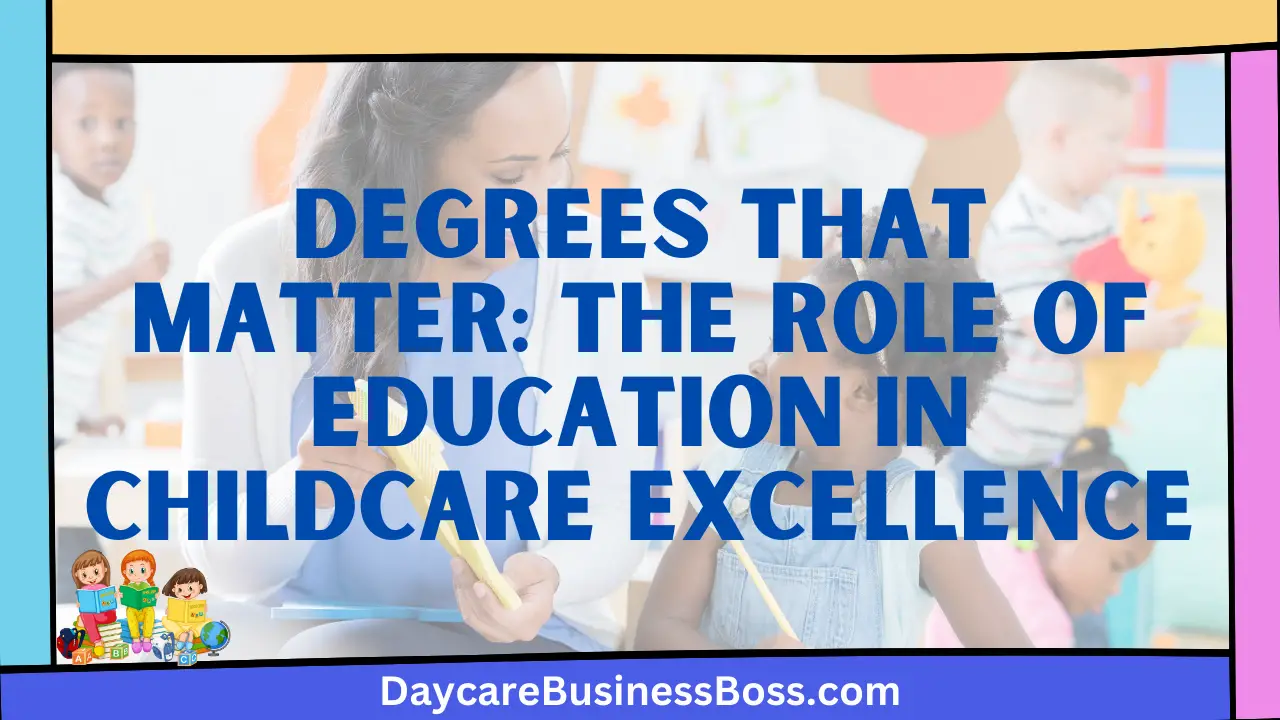The role of childcare facilities has become critical in a society where early childhood education is increasingly regarded as a cornerstone for a child’s development. These facilities not only provide a secure refuge for working parents, but they also play an important part in the development of young minds during their formative years. However, the question that frequently arises is: what degree is required to properly run a daycare?
To operate a daycare, a degree in early childhood education, child development, or a related field is generally necessary. However, prerequisites vary based on location and regulations. A solid educational background ensures the skills and knowledge needed to provide effective care and learning experiences for young children.
This article digs into the complexities of the subject, unraveling the educational journey that provides individuals with the information and abilities needed to embark on this important undertaking. Let’s look at the educational environment that lays the groundwork for daycare ownership and management, from early childhood education to child development and related professions.
The Foundation of Knowledge: Early Childhood Education Degrees

Daycare management is a difficult job that extends far beyond simple supervision. It comprises creating a supportive environment that promotes young children’s cognitive, emotional, and social development. This complex undertaking demands more than just good intentions; it necessitates a sound educational basis. This is where formal education in early childhood education comes into play, providing childcare operators with the knowledge they need to effectively nurture and educate young brains.
The foundation of this educational path is a degree in early childhood education. Individuals with this specialized degree will have a solid understanding of child psychology, developmental milestones, and customized teaching approaches appropriate for young learners.
An early childhood education degree curriculum covers a wide range of topics. This complete education provides childcare operators with a wide arsenal, from diving into child psychology to understanding curriculum development, classroom management tactics, and assessment strategies. These technologies allow them to design age-appropriate learning experiences, negotiate and address behavioral difficulties, and correctly assess the growth of each child in their care.
An early childhood education degree lays the framework for holistic growth by providing childcare operators with the knowledge and skills to design purposeful learning activities. It enables educators to infuse the play with meaning, effectively integrating fun with educational goals. It allows them to create an environment in which curiosity is fostered, social interactions are promoted, and each child’s unique ability is acknowledged and utilized.
Read more about: The Heart of Childhood: Setting Up Your Nonprofit Daycare Endeavor
The Spectrum of Child Development Studies
While early childhood education is unquestionably the foundation of daycare operating knowledge, a degree in child development is an equally significant advantage. Child development is a study of the intricate process by which children grow, learn, and interact with their surroundings. This complete understanding is a powerful asset for people who run daycare centers outside of the classroom.
A degree in child development provides in-depth knowledge of the stages of development that children go through, from infancy through puberty. This understanding is useful in adapting daycare programs to meet the changing requirements of children of various ages. Recognizing the specific needs of each developmental stage enables daycare providers to create activities that are not only interesting but also deeply enriching.
Incorporating insights from child development studies enables daycare operators to construct environments that promote physical, cognitive, and emotional growth holistically. These insights serve as a guidepost, directing the development of activities that promote sensory exploration, language acquisition, and social interactions—all of which are critical components of early childhood development.
Daycare providers can create spaces that encourage curiosity and discovery by embracing child development concepts. Understanding the relevance of imaginative play throughout various age ranges, for example, can lead to the development of imaginative play nooks that promote creativity and cognitive progress.
Meeting Regulatory Requirements: Location Matters
The importance of education in managing a daycare cannot be understated; yet, the specific requirements for such a position are dependent on geographical area and current legislative frameworks. Due to geographic variation, guidelines regulating the necessary credentials for those desiring to operate daycares differ. While some areas require a bachelor’s degree in early childhood education as a prerequisite, others may accept an associate’s degree or comparable qualifications.
For example, in some areas, a certain amount of credit hours in courses relating to child development and care may be required, even though a formal degree is not required. CPR and first aid certificates may be declared obligatory to ensure the safety and holistic well-being of the children in care. These substantial disparities highlight the vital need of staying current on local legislation and procedures. When considering a job in the management of a daycare facility, this critical awareness becomes vital.
Building a Strong Foundation: Skills Gained through Education
In addition to the theoretical foundation provided by formal education, daycare operators develop a variety of vital skills that vastly improve their capacity to offer complete care for young children. Among these, good communication stands out as a key characteristic. Daycare operators must be able to effectively communicate instructions to youngsters while also maintaining clarity in their interactions. Keeping open and transparent lines of communication with parents and staff is critical because it develops a collaborative environment focused on the well-being of the children in their care.
Problem-solving abilities that daycare operators naturally develop are also crucial. Every day brings a new set of problems, from managing conflicts among children to adapting activities to meet different learning styles. These operators’ ability to navigate these problems is greatly enhanced by their extensive educational background. Education instills critical thinking abilities in childcare operators, allowing them to appraise circumstances wisely, design new solutions, and maintain the smooth operation of their facilities.
Creating Impactful Learning Experiences

A daycare provider’s obligations extend beyond simple supervision to the formation of significant learning encounters that serve as the foundation for a child’s educational path. A well-educated childcare provider understands the value of routines that serve as both anchors of security and channels for unstructured exploration and serendipitous learning.
Daycare operators gain a great awareness of the delicate balance between rigidity and adaptability through education. These caregivers provide a stable environment for children by employing organized yet flexible routines that provide predictability while still allowing for spontaneous discovery. This combination not only builds a sense of safety but also creates an environment in which children can confidently pursue their interests.
With a strong educational background, childcare providers may create lesson plans that are targeted to the developmental phases of the children they care for. These well-thought-out curricula engage young minds by incorporating play, art, music, and storytelling into the learning process. Every contact, from finger painting to song singing, is educationally integrated, guaranteeing that every moment spent in the daycare is an excellent chance for intellectual and emotional growth.
The educator’s knowledge enables the introduction of core concepts in ways that are appealing to young students. They learn mathematical concepts through play, express their creativity through art, learn rhythm and melody through music, and build language skills through narrative. These tactics not only capture children’s attention but also nurture a true love of learning, laying the groundwork for a lifelong interest in education.
Read more about: Daycare Entrepreneurship: Building Blocks for a Bright Beginning
Nurturing Emotional Intelligence and Social Skills
Emotional intelligence and social skills are critical components of a child’s overall development. Daycare centers play an important role in setting the framework for these essential characteristics, providing early socialization platforms where young people go on adventures of engagement, sharing, and cooperation with their peers. A wise and educated childcare provider understands the critical need of creating an inclusive environment that not only develops pleasant interactions but also cultivates emotional well-being.
Early childhood development education provides childcare providers with essential insights into the complex emotional needs of children and equips them with appropriate techniques to fulfill these needs. Armed with this information, these caregivers gain the ability to detect indicators of anguish or discomfort that others may miss. This increased awareness allows them to respond with empathy and care, ensuring that children feel not only physically safe but also emotionally validated and treasured in their daycare setting.
The educated daycare operator recognizes that the initial steps toward developing emotional intelligence and social competency take place within the dynamic microcosm of the daycare. These educators help youngsters understand their emotions and navigate interpersonal dynamics through planned exercises and play. They enable talks that promote empathy, cooperation, and dispute resolution, promoting the development of abilities that will benefit the children for the rest of their lives.
An educated daycare provider, in this way, transforms the daycare center into more than just a space for supervision; it evolves into a loving hub where emotional development is as important as cognitive progress. These caregivers transform the daycare experience into a transformative adventure, benefiting the lives of the children they assiduously nurture, by embracing the concepts of emotional intelligence and employing the tools gained through education.
A Commitment to Lifelong Learning
Education in the realm of early childhood development is far from static; rather, it embodies a dynamic and ever-evolving landscape that perpetually expands in tandem with novel research and fresh insights. Within this fluid context, daycare operators armed with a robust educational foundation are more apt to engage in a continuous cycle of professional development. Beyond the initial acquisition of knowledge, these dedicated professionals actively participate in workshops, seminars, and conferences, meticulously curating their skill set and knowledge base to remain attuned to the latest teaching methodologies, cutting-edge breakthroughs in child psychology, and the fluid contours of regulatory frameworks.
This resolute commitment to lifelong learning reverberates across both daycare providers and the children entrusted to their care. By staying abreast of the latest advancements in the field, daycare operators are better equipped to hone their practices and introduce innovative approaches to education. Such dedication ensures that the quality of education and nurturing remains consistently elevated, ever-adapting to cater to the evolving needs of each generation.
This commitment to ongoing learning embodies a profound ripple effect that impacts the children’s experiences within these daycare settings. The application of contemporary insights translates into enriched teaching methods, fostering an environment where children receive education and care that aligns with the latest developmental theories and research findings. As a result, children benefit from an education that is not only current but also meticulously tailored to support their cognitive, emotional, and social growth.
Frequently Asked Questions

Do I need a certain degree to run a daycare?
The educational qualifications for running a daycare may differ depending on the area and regulations. A degree in early childhood education, child development, or a similar field, on the other hand, is often suggested. This educational foundation provides childcare operators with the information and abilities required to provide care and learning experiences for young children. As an alternative to formal degrees, certain regions may accept appropriate certifications or a specified amount of credit hours in child-related education.
How can early childhood development education improve daycare operations?
Early childhood development education equips daycare operators with a thorough understanding of child psychology, developmental milestones, and teaching tactics. This insight enables operators to build activities that encourage cognitive, emotional, and social growth, as well as age-appropriate education. A solid educational foundation also builds abilities like communication, problem-solving, and empathy, all of which are necessary for daycare administration.
What role does lifelong learning play in daycare operations?
Lifelong learning is an important component of running a daycare. Early childhood development is a dynamic field, with continuing research and emerging best practices. Daycare providers that are committed to lifelong learning attend workshops, seminars, and conferences to remain current on trends and ideas. This continual learning guarantees that the quality of education and care stays high, responding to changing child needs and meeting shifting regulatory standards.
To learn more on how to start your own daycare checkout my startup documents here.
The information provided by DaycareBusinessBoss.com (“The Site”) is for general informational purposes only. All information on the Site is provided in good faith, however, we make no representation or warranty of any kind, express or implied, regarding the accuracy, adequacy, validity, reliability, availability or completeness of any information on the Site. Under no circumstance shall we have any liability to you for any loss or damage of any kind incurred as a result of the use of the Site or Reliance on any information provided on the Site. Your use of the Site and your reliance on any information on the Site is solely at your own risk.
This blog post is for educational purposes only and does not constitute legal advice. Please consult a legal expert to address your specific needs. Terms and Conditions. (https://daycarebusinessboss.com/terms-conditions/)

Meet Shawn Chun: Entrepreneur and Childcare Business Fan.
I’m a happy individual who happens to be an entrepreneur. I have owned several types of businesses in my life from a coffee shop to an import and export business to an online review business plus a few more and now I create online daycare business resources for those interested in starting new ventures. It’s demanding work but I love it. I do it for those passionate about their business and their goals. That’s why when I meet a childcare business owner, I see myself. I know how hard the struggle is to retain clients, find good employees and keep the business growing all while trying to stay competitive.
That’s why I created Daycare Business Boss: I want to help childcare business owners like you build a thriving business that brings you endless joy and supports your ideal lifestyle.


